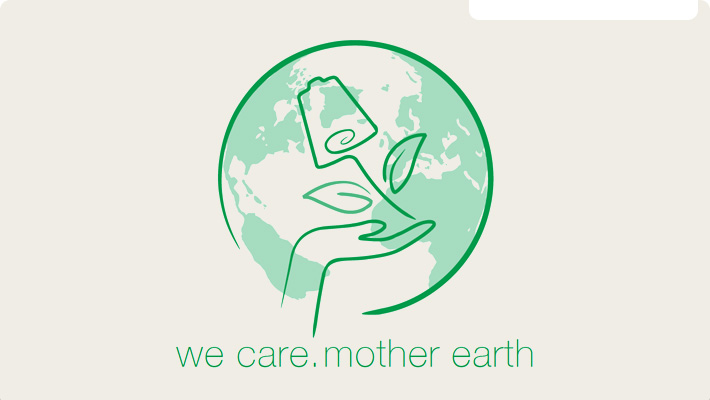Sustainability
"the planet earth is not inherited from our ancestors
but, we have borrowed it from our grand children"
Definition of sustainability
Development meeting the needs of the present without compromising the capacity of future generations to meet their own needs." (Brundtland, Society oriented)
"Improved quality of life without compromising the quality of life of future generations."
(UK Government)
Lenzing fibres from the plant world
Lenzing fibres - Lenzing Viscose®, Lenzing Modal®, Tencel® are made from wood. When the raw materials for Lenzing fibres are growing, botanic principles apply: CO2 is converted into oxygen. Likewise fibre production obeys the principles of sustainability. Valuable by-products from the process are recovered and used again.
Our constant efforts to keep our promise to Mother Earth have brought about revolutions
- Vortex spinning technology, a one-of-its-kind in the textile value chain eligible for carbon credit as it saves energy of over 30% compared to conventional spinning technologies
- Regenerated cellulose fibers manufactured from wood ensures the principles of sustainability whereby valuable by-products are recycled which guarantees its eco-friendliness
- Fibres free from any harmful substances and accr edited with Oeko-Tex standard 100
- Sustainability is a key aspect that is monitored for all products and raw materials at all stages of development of our products
Wind Mills
Pallavaa group generates 65% of its energy requirement through its
own wind power.

Water Footprint

The water footprint of an individual, community or business is defined as the total volume (cubic meters per year) of fresh water that is used to produce the goods and services consumed by the individual or community or produced by the business.
Water foot print (Global average virtual water content in litres):
| Products of Cotton | Product Weight | Total Volume of Water |
| 1 Jean pair | 1000.00 | 10,850.00 |
| 1 Single bed sheet | 900.00 | 9,750.00 |
| 1 T-Shirt | 250.00 | 2,720.00 |
| 1 Johnson's cotton bud | 0.33 | 3.60 |
| Cut / Staple fibers | Volume of water consumed (litres per kg of fiber) | Required acrage / ton |
| Tencel | 263.00 | 0.24 |
| Viscose | 319.00 | 0.33 |
| Modal | 472.00 | 0.70 |
| Cotton | 5,800.00 | 1.07 |
Carbon Footprint

The carbon footprint indicates all green house gas (GHG) emissions along the complete life-cycle of a product, which indicates the cost (in kg of CO2 equivalent) of the extraction of raw materials, production, transportation, distribution, use phase and disposal.
| Carbon footprint on travel (approx, at a glance in CO2 / Year) | |
| A drive by car 50 km | 3,000 kg |
| A drive by bus 50 km | 1,000 kg |
| A flight trip to New York - Chennai | 4,000 kg |
| Product Carbon Footprint (in kg CO2 e) | |
| Long - Shirt White (Knit), Cotton | 10.75 kg |
| Sweat - Jacket fuchsia | 13.42 kg |
| Acrylic Children Jacket | 13.67 kg |








